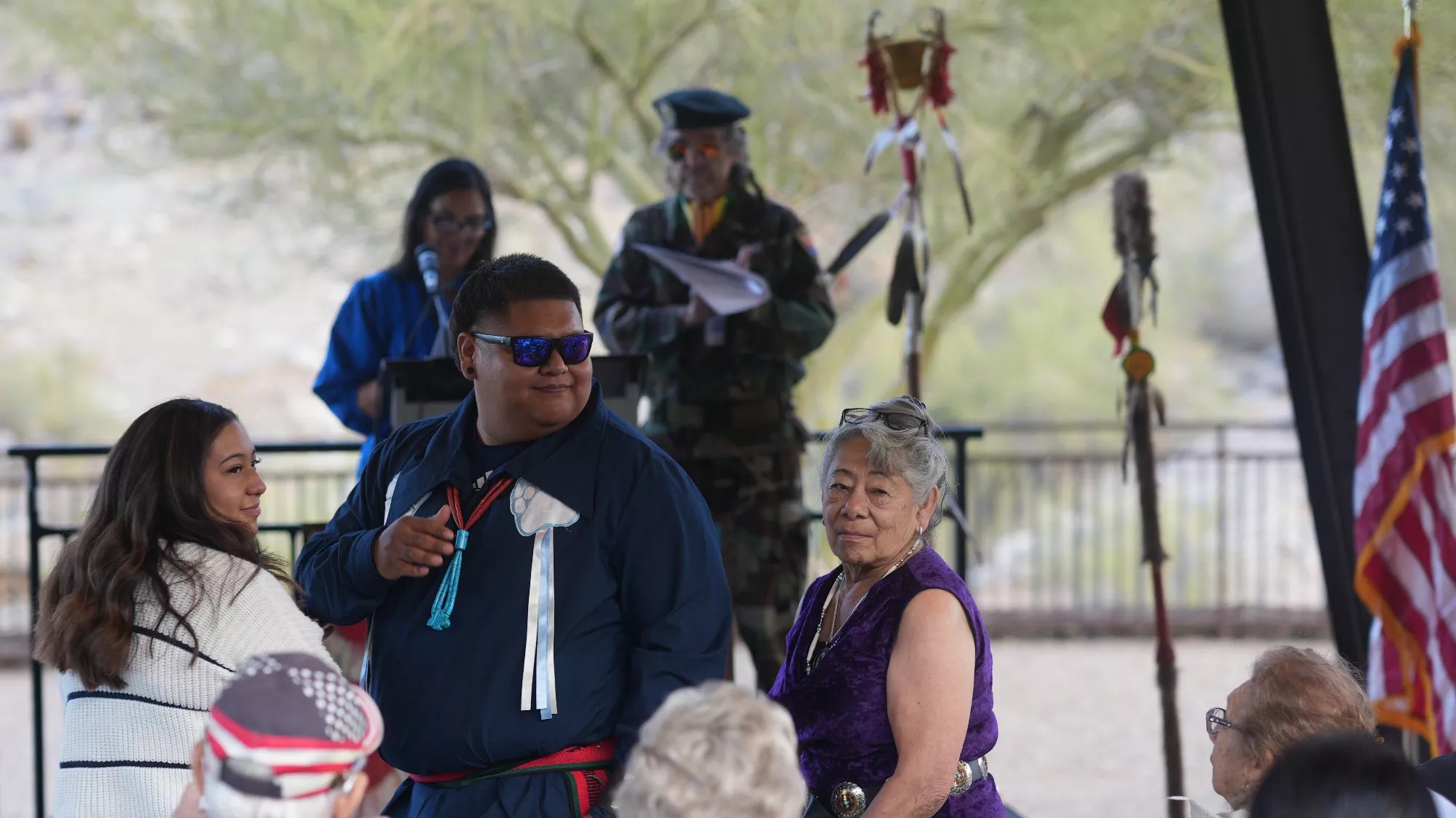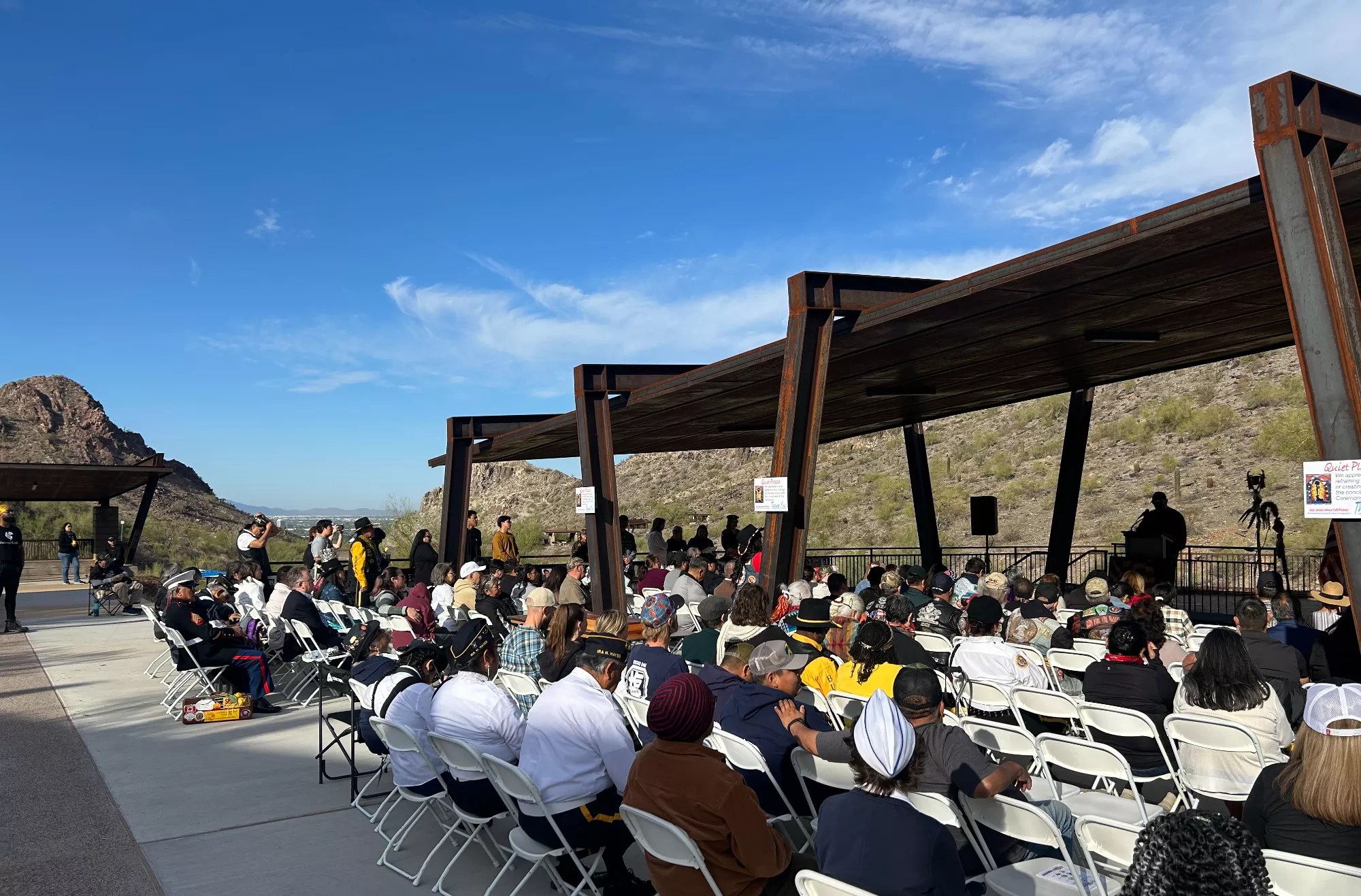
Michael McDaniel

Audio By Carbonatix
Last week, the Trump administration attempted to whitewash the unique contributions of Native Americans to the U.S. military by deleting webpages dedicated to the Navajo Code Talkers. A few days later in Phoenix, dozens of veterans of all skin colors and backgrounds gathered at dawn to celebrate the lives of fallen soldiers, with a particular emphasis on Native Americans.
At daybreak on Sunday, the surviving family members of Lori Piestewa congregated at the mountain that for two decades has gone by her name. In 2003, Piestewa was killed in Iraq, becoming the first Native American woman – Piestewa was a member of the Hopi tribe – to die in combat while serving in the United States armed forces. In 2008, Piestewa Peak was given its current name in her honor.
“Why do we continue to revisit this painful moment? Why do we have to wake up so early?” Piestewa’s son, Brandon Whiterock, asked to laughter from the audience. “As I’ve grown, I’ve come to realize that this memorial is not just about looking back – it’s about recognizing the sacrifices of those who came before us and carrying their stories forward. I know my mother’s legacy is to bring people together.”
Lori’s father – Terry Piestewa, who died in 2017 – also served, fighting in the Vietnam War. Her mother and daughter, Percy and Carla, also spoke briefly at the ceremony.
“It’s like a family,” Percy Piestewa said to the crowd. “We all come together and learn all new things and we all disappear again and then we come back.”
The event featured a number of Native American customs. A white horse painted with Hopi and Indigenous iconography walked down the mountain without a rider, which in Native American culture symbolizes a warrior lost in battle. A drum circle of veterans provided music during and the Star-Spangled Banner was sung in Navajo.
So far, Piestewa’s legacy has survived the rancor of the MAGA movement’s war against diversity, equity and inclusion. Her namesake mountain, originally called Vainom Do’ag by the O’Odham people who lived in the area before settlers ever arrived, was named Squaw Peak by white settlers sometime in the 19th or early 20th century. “Squaw” is a derogatory, racially-charged word for young Native American women used by the white settlers who tended to view them as less-than-human.

Dozens of veterans of all backgrounds attended a sunrise ceremony to honor the life of Lori Piestewa, the first Native American woman to die in combat while serving in the U.S. military.
TJ L’Heureux
Name change
Five years after Piestewa’s death, the U.S. Board on Geographic Names officially changed the name to Piestewa Peak. The offensive former name is still in common usage among longtime Valley residents, and it doesn’t take much searching to find people begging Trump to change it back.
That context wasn’t far from the mind of Jim Covarrubias, a prolific Native American painter of Tiwa ancestry and a former U.S. Army officer who was drafted into the Vietnam War. The mountain is an ancient holy sight for Indigenous peoples, said Covarrubias, who chairs the Piestewa Fallen Heroes Memorial Ceremony. In ancient times, the big crystal rock about 100 feet from the top of the mountain was “sacred for the Natives.”
“They would touch it four times to bless the womanhood of their family and people who were giving birth to protect them and make a prayer for them,” Covarrubias said. “We’d all gain so much by being part of our ancient culture and absorbing some of the attitudes about the environment, human rights, women’s rights, et cetera.”
Since being given its current name, the mountain has come full circle. There have been no signs that anyone with the power to do so wants to remove Piestewa’s name from the landmark, but Covarrubias doesn’t hold the current occupant of the White House in the highest regard. He blasted the Trump administration’s deletion of Navajo Code Talkers web pages from government websites, which was reversed after widespread backlash.
“It’s an egregious affront on the dignity of serving,” Covarrubias said. “It’s just racist. There’s no other way to put it. It’s just sad that we have to go back to that attitude when there’s been so much work done by great Americans of color to try and correct this in a nice, nonviolent way.”
Organizing the annual ceremony has been “a beautiful burden” for Covarrubias, which he does to help out his fellow vets. He’s grateful that Piestewa’s family is willing to let her memory serve as a way to bring people together: “They had to let down so much of their privacy and accept all of this attention and go over the stories a thousand times when people always ask the same things.”.
Whiterock didn’t directly address the current anti-DEI backlash sweeping the country. But he did make a point to note the importance of his mother’s heritage to her story.
“We all come from a race of warriors,” he said, “resilient people who fought not just in battle, but fought to preserve our culture, our beliefs and our way of life.”